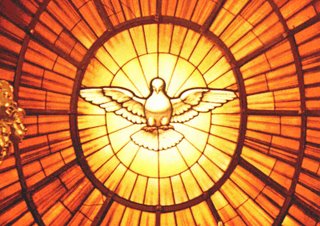 Last week, Andrew Jones posted a brief piece on his TallSkinnyKiwi blog, and it’s not only stuck with me but merged with yet another rumination from an even older post on Scot McNight’s Jesus Creed. First, a blurb from Jones’ post, written after he’d witnessed and helped after a terrible accident where a pedestrian was hit by a car:
Last week, Andrew Jones posted a brief piece on his TallSkinnyKiwi blog, and it’s not only stuck with me but merged with yet another rumination from an even older post on Scot McNight’s Jesus Creed. First, a blurb from Jones’ post, written after he’d witnessed and helped after a terrible accident where a pedestrian was hit by a car:Accident scenes witness the amazing self-organisation of emergent theory. A group of strangers become an instant team of helpers, suddenly collaborating, stepping in to lead with giftedness and talents, stepping back when not needed. One knows first aid. Another stops traffic. One calls the ambulance [that was me]. No one under orders and yet order emerges within seconds. It’s a frightful, horrible, terrible thing to be at the scene of an accident like this and I wish it on nobody. And yet it is moments like these when people become their best and the human community under God finds wind, finds love, justice, hospitality, selfless giving, and acts like the community that God desires.While I too wouldn’t wish a scene like this on anyone, Jones’ image of emergent theory works for me. It helps me grasp the organic nature of what many of the emerging thinkers call us to witness. Now, here’s a blurb from a much larger McKnight’s post, where he’s actually dealing with the now-so-in-the-past (ack, was it only last month?) Gospel of Judas:
…the only substantial argument against the alternative Gospels is a confidence that God’s Spirit directed the Church (inspired the texts and preserved the texts and led the Church to recognize the texts) to the canonical Gospels. But, along with this we can say this: the text is late, the orthodox Christians said The Gospel of Judas was nonsense, and the theology (which is clearly gnostic) is not 1st Century Jewish/Galilean. No one can dispute any of these three points. [bolded italic mine]What struck me about McKnight’s post is taking the canon as reliable not only by historical development but also by a confidence that God inspired it. While I have had long knowledge of this (and even repeated it on many occasions), I suddenly realized how much more I relied on the historical formation of the canon for reliability rather than God’s inspiration. Now don’t get me wrong, I am a firm believer that ours is a reasoned faith. My personal revelation is that I was relying more on reason than I was on trust—a pattern of mine of late.
So, how do these two posts come together? They both point to something that attracts me to the emerging discussion: the allowance for and recognition of the Spirit moving dramatically in our history/present. It is the Spirit, bottom line, which directed the church in Acts and the years following. And it is that oh-so-mind-boggling Spirit that hovers and moves today, under which we form God’s community—a community that (as Jones writes) “finds wind, finds love, justice, hospitality, selfless giving and acts like the community that God desires.” Laced through much emerging folk discussion, there is a sense of moving forward in trust and waiting expectantly to see what’s going to happen—like Eugene Peterson’s version of some of my favorite verses in Romans 8:
This resurrection life you received from God is not a timid, grave-tending life. It’s adventurously expectant, greeting God with a child-like “What’s next, Papa?”I am good at planning, organizing and ruminating over ideas, theologies and plans but not so good at leaping and living in God’s wide open spaces where his Spirit always is but I’m not looking. Anyway, I think this is one valid and worth-listening-to aspect of emerging discussion. We all (who else is the church?) could do with much more of this resurrection life.
(Image: The Holy Spirit depicted as a dove in the stained glass window behind the Cathedra Petri in St. Peter's Basilica, Rome (Wikipedia))